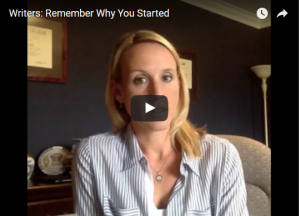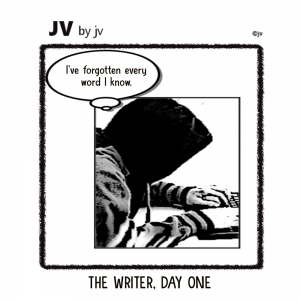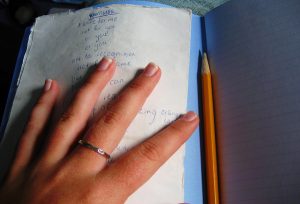Process
photo by Will Montague via flickr
There is a reassuring piece of advice that I find myself giving writers over and over these days, in the hope of sparing them not only a ton of rewriting, but saving them from that nagging voice that keeps suggesting they take up needlepoint and have done with this crazy writing thing once and for all.
It’s this: When you’re stumped about what might happen next, or where the “drama” will come from, or what your protagonist will do, you don’t have to look further than your story’s own backyard. But unlike Dorothy (why does everything always seem to come back to The Wizard of Oz?) just looking won’t do the trick. For writers, you have to dig in it. The good news is this: there is always buried treasure there beneath the surface. Always.
This advice seems relatively straightforward and easy, but it turns out to be hard to implement because there’s a big fat writing myth that gets in the way.
The myth is this: when stumped, the answer to “what should happen next?” is found by turning to the outside world, as if there’s a generic grab bag of Dramatic Possibilities that you can reach into and, voila! problem solved! And so suddenly, out of the blue, it turns out that your protagonist may have murdered her ex-husband (geez, I didn’t even know he was dead); or is now battling a supernatural force that is out to either a) kidnap her child or b) sap her life force for unspecified nefarious purposes; or suddenly she has a lifelong debilitating disease.
The trouble was – in each of those four real cases — that the Dramatic Possibility had absolutely nothing to do with the story the writer was telling. This was a glitch that, once pointed out, the writers in question instantly recognized for what it was: a darling quickly in need of dispatch, rather than what they’d thought it was: a way to amp things up, to make things happen, to be dramatic and so – they hoped – hook the reader.
The irony was that instead of pulling the reader in,
Read MoreThis was a difficult post.
I began by writing it; then I deleted it. I tried to write it again, but the words seemed too stark and impersonal. I took a walk and imagined a better way to say the things I needed to say. Then it dawned on me:
Just *say* it.
How have you made peace with your novel in the drawer, or with a setback in your career?
Read Morephoto by Xygp via Flickr
This column is 11 days late. It should have gone up almost two weeks ago, on my normal date: the second Thursday of the month. But by that Tuesday, although I’d spent days on it and written thousands of words, nothing worked. I went in circles, I dove down rabbit holes, everything I wrote was confusing. I know because my brilliant coach Jennie Nash not only told me so, but pointed out why. And she was always right.
Panicked, I reached out to Therese, who gave me a reprieve, kindly arranging for someone to switch days with me, allowing me more time to write.
I’ve spent the past week writing failed draft after failed draft. Right now it’s Friday afternoon, and I’ve still got nothing.
Because – and it’s painful to admit this — I’ve been writing a column that would’ve been a lie.
And, apparently, I can’t do that – not, however, for lack of trying. I feel like a character in a story – fearful of owning what I honestly believe, feeling incredibly vulnerable. On the surface I want to seem calm, implacable, together. Inside, I’ve been a raging mess.
Read MoreBy chelseadaniele in the Creative Commons
We’re very happy to welcome Tonia Marie Harris as our guest today. Tonia resides in south-central Illinois with her husband, three children, and three rescue animals. In addition to writing novels, poetry and essays, she is President of WME Community Works, a non-profit organization that spearheaded the recent development of a grassroots library that serves her village and the surrounding communities. Tonia’s latest work-in-progress is a coming-of-age novel tentatively titled The Education of Sugar Girl. Her work has appeared in Twice Upon A Time, a collection of reimagined fairy tales, Hand/Eye Magazine, Mash Stories, Silver Birch Press, and various anthologies.
I’m a process junkie. When I finish a book I love—everything from Wally Lamb’s She’s Come Undone to Donna Tartt’s The Secret History—I immediately want to know the how and why behind the scenes evolution of the story. What I realized was that my own process would never come together if I didn’t simply dive into the deep end and write the darn story.
Connect with Tonia on Facebook and Twitter.
Confessions of an Intrepid Mermaid
I’m swimming. The water mutes the sound of everything but the distant beat of my heart. The water itself is an echo of that rhythm. Voices and the pounding of feet above me are the sounds of another planet. I am a transmitter for something else entirely—the urge to move forward and rise for another breath and plunge back into the water again. Here I have no need for peripheral vision.
This is the recurring dream I had over the summer. This dream of swimming. If you analyzed this dream, you would tell me I’m on a journey through the depths of my subconscious. You would be right.
I am a plotter. I survey the land, measure the depths, and calculate the constellations. I am a pantser. I leave behind the diagnostics to plunge in and discover the wavering depths of story.
Another Word for Forward
This is my first confession: I’ve spent more time in this last year trying to define what kind of writer I am than doing actual writing.
I want to be a plotter. In real life I came to intimately know the power of to-do lists and preparation. Colorful index cards and the phantasm that is Scrivener lured me like a siren song. I spent months planning a dark fairy tale only to discover it wasn’t the story I wanted to write at this moment, not yet. Not the if I had time to write one book what would it be book.
I tried to plot my current manuscript, but each time something stopped me. Depression. My father’s cancer. More depression and all the wins and losses of daily life that can enrich our writing all while draining our power supply.
I tried pantsing. Familiar territory for someone who for years self-identified this way. It was all false starts and a brooding sense of failure. I wondered if my love for writing and this story in particular was a clichéd tale of star-crossed lovers.
What kind of writer was I, and why was I compelled to label myself before I could move forward?
Confession number two: I suck at achieving […]
Read MoreBy Amanda Steggell via Flickr’s CC
Our guest today is Carol Dougherty, also known as Doc, director of Wake Up and Write Writer’s Retreat Workshop (an offshoot of Writers Retreat Workshop), where she teaches writing practice and much of the curriculum developed by the late Gary Provost. She is ordained as a Zen Buddhist priest in the lineage of Shunryu Suzuki-roshi, and spent more than 10 years at San Francisco Zen Center and Tassajara Zen Mountain Center. Carol worked extensively in professional theatre early in her career, culminating in a stint as Managing Director of the Berkshire Theatre Festival, where she had a chance to meet lifelong hero, Julie Andrews, and work with Marge Champion and Julie Harris, among others. Her all-time favorite book is not a novel, it is Virginia Axline’s Dibs: In Search of Self, which she first read as a Reader’s Digest Condensed book when in grade school and has re-read many times since. She is an avid reader, writer, and student, with a penchant for horse racing, Shakespeare, and the Pittsburgh Steelers.
Carol is the author of The Santiago Inheritance (novel), How Full of Briers: The Organizational Structure of the Non-Profit Theatre Corporation (non-fiction). Connect with Carol on her blog.
You are attending your first writing workshop, a major investment of time and money, which you feel sure will pay off big-time. After all, you have in your work-in-progress the next Beloved, The Hunt for Red October, or Me Before You. You are certain that before dinner is over, everyone will know, without having read a word, that you will be the new David Baldacci or JK Rowling.
At the same time, you are thrilled to be at this workshop, with an opportunity to get feedback (which you are sure will be wonderful) from a writing teacher whose work you respect, and whose books have helped many an aspiring novelist. You want to bask in the opportunity to spend this time completely focused on your own work-in-progress and not have to worry about cooking your own meals and then doing the dishes. Here, you are a writer.
Without any maneuvering, the workshop leader sits next to you at dinner, and appears to be amused by your witty repartee. Everything seems to be working as planned.
A funny thing happens after dinner. The group gathers for the opening session, and lo and behold, you are the first one to share your book title and the hook you have crafted. Suddenly you discover that you don’t have a protagonist, you have a victim. To be a protagonist the main character has to act, rather than simply be acted upon. Yours doesn’t act, she reacts.
You also find out that your book title, which is your protagonist/victim’s first name (evocative, you felt), tells the reader nothing. And you […]
Read MoreI recently watched a TED talk with Stanford University psychologist Carol Dweck, about educators and students and something she calls ‘the power of yet.’ Carol began her talk by referencing a school in Chicago whose teachers chose to give a grade of ‘not yet’ instead of the dreaded ‘F’ when students hadn’t passed a subject.
What a revelation, to think like that — not in terms of failure, but rather instead of future potential.
You’re not yet there. But you will be, you can be; just keep going.
Carol spoke, too, of a time when she purposefully gave a group of middle-school students a problem they weren’t yet ready for, wanting to gauge their response. Would they feel helpless or cope somehow? Well, some of the kids did feel hopeless, helpless, in the face of a too-hard challenge, while others recognized their personal ‘yet’; no, they couldn’t yet rise to the test, but they knew they might be able to meet it later. After they’d grown, learned, lived a little more life.
These kids, the yet-kids, had what Carol termed a ‘growth mindset’ as opposed to a fixed one.
What about those students with a ‘fixed mindset’? As you might guess, they were devastated at their own perceived limits. They were not smart enough, they thought. Not talented. Not measuring up. Not capable of success. In Carol’s words, “Instead of luxuriating in the power of yet, they were gripped in the tyranny of now.”
The tyranny of now. Sit with that idea a moment. If that doesn’t feel like a box, I don’t know what does.
Read MoreDepending on who you ask, writing might be either a delightful lark or an exhausting, depleting trial-by-fire.
And in honor of Labor Day, it’s a great question to consider: is writing work?
On one hand, yes. Of course it is. Any creative pursuit involves opening up your heart and mind and veins to produce something you love, which is harder than, say, tallying up some figures or answering phones or doing other, less fraught tasks to pay the bills.
On the other hand, aren’t we, as writers, lucky? When the writing is going well, it hardly feels like work at all. We are charmed enough to be able to pursue something we love, whether it pays the bills or not. Rearranging words on the page is certainly not physically dangerous, like descending into a coal mine, or a daily obstacle course of life and death, like cardiothoracic surgery.
It can be hard on both counts. Hearing others belittle your work — “oh, you get to write? that must be so fun, not to have a real job!” — is painful and unpleasant at best, soul-deadening and humiliating at worst. And yet, I think most of us have also had the experience of hearing another writer drone on about how challenging and impossible this kind of work is, how writing is harder than anything else in the world.
It is hard. It is not that hard.
Read MoreBy Lorna Carlson, Flickr’s Creative Commons
Please welcome back guest Lisa Alber who writes the County Clare mysteries. Her debut novel, Kilmoon, was nominated for the Rosebud Award of Best First Novel. Kirkus calls her second novel, Whispers in the Mist, a “worthy successor to Kilmoon in tone, mood, complexity, and keen insight into human failures and triumphs.” She balances writing her third novel (Midnight Ink, August 2017) with gardening, dog walking, and goofing off. She lives in Portland, Oregon.
You can find Lisa online on Facebook and Twitter.
When Your Characters Need Therapy
A few months ago, a writer friend enthused about her novel in progress. Her characters had taken on lives of their own, and she was in the flow, she was transported, she was SO EXCITED about her novel.
We sat on my patio sipping Tempranillo—honesty: she sipped, I guzzled—with my little dog Fawn snoozing on the lawn chair. The hydrangeas and geraniums and marigolds and begonias were ever so jaunty … But never mind all that nicey-ness, I was grumpy, and made even more grumpy by my friend’s enthusiasm.
Obviously, her characters were well adjusted. There was apparently not a wishy-washy story arc or murky primary motivation among the bunch. Meanwhile, I’d stalled on the first draft of my third novel at about 70,000 words.
My main characters, Danny and Merrit, had gone silent on me. I knew how the story ended, the problem was getting there, and at 70K words, I was heading into the climax and resolution, and I had no clue what to do. I tried thinking about my dilemma purely in terms of plotting to see if the characters would wake up from their own personal Zombielands. I spent a week banging my head against my desk. My brain doesn’t do plot without the deeper character connections to give the plot points SOUL. Yes, SOUL—a.k.a. the internal storylines. Plot points are great, but without soul I couldn’t write them.
So I returned to my characters. I remembered one of my earliest writing lessons from bestselling author Elizabeth George in her craft book, Writing Away: “I become my character’s analyst.” She’s referring to writing character analyses as part of her development process.
I’m a big fan of the therapeutic process, so I decided to engage my characters in a little therapy, en media res, as it were. I pulled out my novel journal, a black-and-white composition book, and tackled Merrit. It went something like this:
Read MoreStéphane Magnenat via Wikipedia Commons
If you’re a writer— professional, part-time, aspiring, or something in between— then chances are you got into the job because, not surprisingly, you love to write. My husband and I were just this week talking about doing the job that you’d do even if you were never payed for it— and definitely writing is that for me. I write seven days a week, year-round, simply because even on the hard days I couldn’t love it more.
But we all have experienced those hard days: times when we feel like we’ve lost the spark of delight in what we’re working on. It might be a scene, a chapter, or an entire book that suddenly feels flat or empty or just lifeless on the page. So here are my top four strategies for bringing back the joy and getting back on track when it feels like your spark is gone.
1. Don’t despair. Things may actually not be as bad as you think they are. Just this week, my writing partner and I were remarking that it’s practically impossible to write a book without at some point being convinced that it’s utter crud. But those are dark, desperate moments. Don’t trust them! Put the work aside for an hour or a day— take a walk, watch a movie, do something to relax— and then approach your story with new eyes. In my experience the chances are extremely good that you’ll find the book isn’t nearly as much a mess as you thought. In need of edits, sure, but anything can be editing and fixed. Just remember: you can’t edit a blank page.
Read MoreMaybe it’s because I’m the daughter of two architects, but I’ve always thought of writing a book as being like building a house. You pour the foundation, frame the walls, install the roof, rough-in the plumbing and electric… etc. etc. If you’re a plotter, you’ll do all this work based on blueprints you drew up ahead of time. If you’re a pantser, you’ll just rent a cement truck, buy some lumber and bricks, and hope for the best.
But the reality is, most of us will never build a house from scratch. So maybe a more relatable starting point for the analogy is moving in and decorating.
Read MoreSo it’s back-to-school time and right now my heart’s going out, as it does every year, to my youthful compatriots in creativity, earnest young strivers desperate to know that the writer’s path is one they can fruitfully walk. It’s so hard when you’re that age (okay, any age) and you yearn for a life of creative engagement but all these obstacles stand in your way. Can you make it pay? Can you meet others’ expectations (or silence their objections)? Can you stand before the world saying, “This is my voice! It means something to me and I want it to mean something to you!”? (Can you punctuate that last sentence correctly, ‘cause I’m not entirely sure that I have.)
For young people in thrall to such questions it’s a particularly knotty problem. Think of the burden they bear: completely creatively inflamed and pretty completely creatively disempowered. This is the lot of any high school or college student who is being channeled away from (or is self-channeling away from) the writer’s life or any other life of creative pursuit. That’s not what they want. They know it’s not what they want. They just don’t know if what they want is a realistic or viable option.
Let’s say that the writer’s life is a roll of the dice. I don’t personally think that it is; I think that choosing a life of the mind, any life of the mind, is about as sure a bet as you can make in life, in terms of happiness, fullfilment and getting down to the isness of it all. But that’s not how it looks to an earnest young writer. It looks like a big gamble, and what if it doesn’t pay off? That future has disastrophe written all over it.
How can we set that young person free?
There stands a writer, desperate to walk the writer’s path, and desperate to know that the path will be fruitful… successful. What can we say to that writer? Here’s what I’d say.
1/ The path is the path. You’ll either walk it or you won’t. But the decision to walk it – the simple act of saying, “I’m a writer” – opens every meaningful door. If you’re wondering whether you can be a writer, the words “I am a writer” are an epic expression of self-fulfilling prophecy. Say you are and you are.
2/ Get support on the path. Creative people ally themselves with creative people. Once you’re a writer you’re in community, and in community there is strength. So go ahead and self-define as a writer. Once you do that, you can go where the writers go, and discover that they’re just as insecure and crazy and hell-bent as you are. As a writer you’ll need that, so get it.
Read MoreI can’t remember exactly who taught me the fine, messy art of collaging a novel—it was either Jenny Crusie or Susan Wiggs. Pretty sure Susan mentioned it first, but either way, it’s been a part of my process for a long time. I’m currently building a collage for a novel of women’s fiction, and as I worked on it over the weekend, I was reminded of the value of the process.
Some writers scoff at this process, finding it a waster of time. Maybe some of you fail to see how an art-based project can help you build a book that’s made of words. If you’ve never tried it, however, maybe give it a shot.
The basic process is straight-forward: you use images and other physical or visual materials to create a snapshot of your book. It can be very simple or very complex, and does not require any particular skills or any kind of artistic bent. Jenny, the former art teacher, builds astonishing collages, three-dimensional and with all sorts of gadgets and gizmos. Susan once built them of them of paper board and magazine cut-outs and now has moved her work to Pinterest. I fall somewhere in-between. (The photo above is from the collage I made for How to Bake a Perfect Life.)
The product is not the actual point. It’s a process tool. Using tactile, visual, or textural materials, you get out of your logical, verbal left brain and allow the loose, associative right brain to play.
Let me stress again that you do not need artistic talent. You don’t need to create something “beautiful.” No one else has to see it. Ever. You don’t even have to keep what you make, though I find the snapshot very grounding over the weeks and months it takes to complete a book. For example: On the current board, a photo of a row of worn, paint-splattered female cowboy books brings me back again and again to a basic concept of one main character.
Read MoreImage – iStockphoto: Antonius
Warning: This Column May Make You Angry
No, not that kind of trigger. We’re not talking gun violence today, although I encourage you to do so, every chance you get—it’s that important.
But, as it happens, I’ve just demonstrated what we are talking about: trigger warnings.
If my provocation for you today had been about gun violence, would you consider it to be my job to warn you of that?—just in case you’d suffered one of the unspeakable experiences that far too many of our fellow citizens are having in this age of gunpowder and rage?
Speaking of rage, would you say that the author Zygmunt Miłoszewski, whose Rage is out from AmazonCrossing this month in its English translation by Antonia Lloyd-Jones, owes you a warning that its story involves domestic abuse? Miłoszewski forcefully engages his readers in examinations of various social ills in his books. Another of his novels, for example, revolves around anti-semitism. Want a trigger warning for that?
I bring this up because this week Colleen Hoover, an author with Judith Curr’s Atria Books, has written well to the question of trigger warnings.
Her It Ends With Us is out this month from Atria and, Hoover writes, “I’ve received quite a number of negative reviews in relation to the lack of a trigger warning for the subject matter…and for writing about such unhappy things.”
Personally, I might need a trigger warning for male love interests named Atlas and Ryle, but that’s just me being me, what an ass I am, imagine suggesting that the romance genre has a thing for fanciful character names, I’ll just shut up about all that, you’re welcome.
But seriously. Hoover is making such a valid point, one we all need to consider.
She’s made the choice on It Ends With Us to add this line to her sales page in deepest, darkest Amazonia (where the consumer-reviewers run wild and the drumbeats are so ominous): “This book contains graphic scenes and very sensitive subject matter.”
Should she have to do this?
Hoover, in My Thoughts On Trigger Warnings, writes:
As a fellow reader with my fair share of past experiences, I understand that there are issues some people do not want to read about. But as a writer, there are many things I don’t want revealed in the blurbs of my books.
And David Vandagriff picks up the point at The Passive Voice, ably coming to her side:
PG has enough experience in life to know that the number of ideas or concepts that will upset someone somewhere approaches infinity…When ebooks can be distributed around the world within a few hours, it is almost certain that a writer in one culture is capable of disturbing a reader in another culture with no intent to do so. Indeed, it may be impossible to discuss some topics without upsetting readers somewhere in the world.
Of course, his input triggers 113 comments. Hoover’s piece triggers 79 comments.
Congratulations, we now need trigger warnings about trigger warnings.
The surrealism of this Summer of Darkness already Trumps any trigger warnings that might once have been needed for bug-phobic readers about Franz Kafka’s Metamorphosis.
Here’s […]
Read MoreWords Flow by katie wheeler, Flickr CC
Please welcome back guest Gaëtane Burkolter: born in Africa, she spent her early childhood in Switzerland, grew up in Australia and recently completed a four year stint in Italy. Gaëtane has a Bachelor of Arts (Communications) from the University of Technology, Sydney, and almost twenty years of experience in government communications and public relations. Becoming a parent relatively late in life opened the floodgates to long-suppressed creativity, and she is now a multi-passionate artist pursuing writing, photography, and painting. As an introvert and low-techer, she is undecided about whether she has what it takes to make it in the rough and tumble of the publishing world, but has “sneakily completed” the first draft of a sci-fi novel anyway.
Read more of Gaëtane’s musings on how to manage anxiety and other messy feelings for creative types on FaceBook, with her group First Aid for Writers, catch her on Instagram @cajetanedesign, and connect with her through comments to this post—but please note she will be responding from her home in Australia, and because of the time difference from the U.S., there may be a delay in her replies.
Me and My Excite-O-Meter: Having Fun With Structural Revision
I hit a rough patch a few weeks back, heading into deep revision of my first fiction manuscript. I didn’t know where to start. Overwhelm set in and then I panicked. What do I know about fixing up a dirty first draft? Where am I going to get the energy to trawl through that sucker? How could I possibly drag myself up off the floor to face my mistakes after the triumph of crashing through to ‘The End’?
And the most horrible, awful thing of all? The reams of advice out there. So many guidelines, so many excellent insights, so many guaranteed formulas for success. Terrifying.
I knew I needed to assess the overall structure of my novel. I also knew there was a veritable canon of texts I could draw on.
But.
I was scared to go there. I mean, some days I call this manuscript my crash test dummy. How could I hope to align that mess with all those fabulous formulas? Unfortunately, as a newbie novelist, anxiety often gets in the way, not just of my best work, but of any work at all.
After faffing about for several long days (okay, you caught me – it was weeks) I decided I needed to lighten up. I exhort my kids all the time to just have fun with school projects, after all. If I couldn’t face using formal techniques to assess my novel for revision, then it was time to get down to serious play. Even Einstein believed that ‘associative play seems to be the essential feature in productive thought’ and I’m not one to argue with geniuses. Genii? Moving on.
People, I invented an Excite-o-Meter.
Oh yeah. You know you wanna know more.
Read More




















